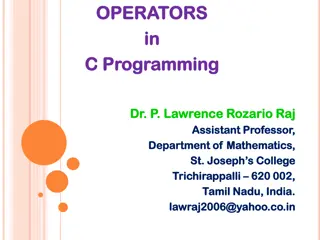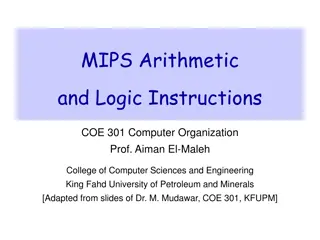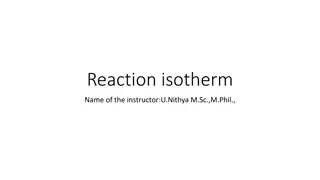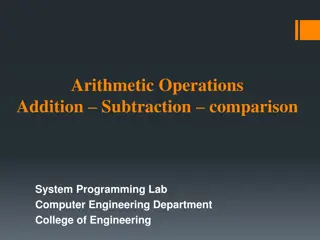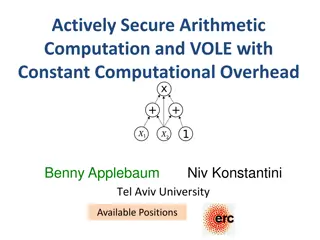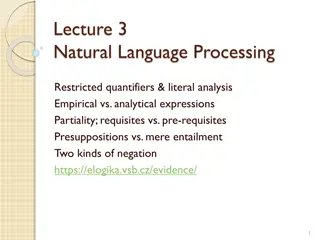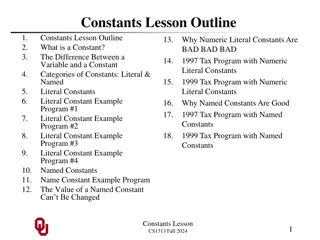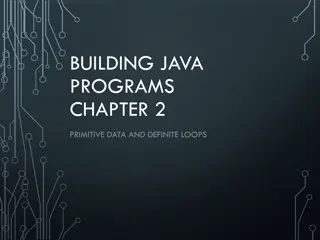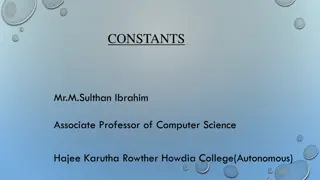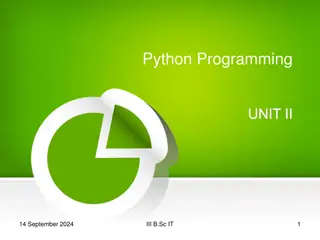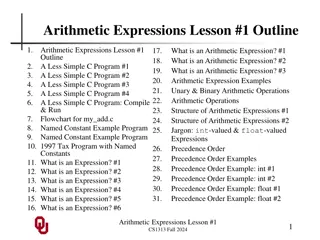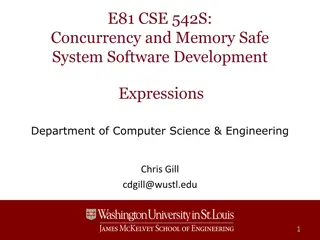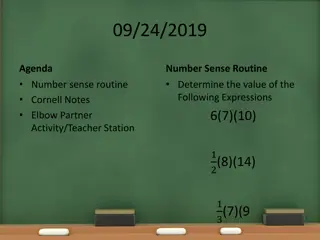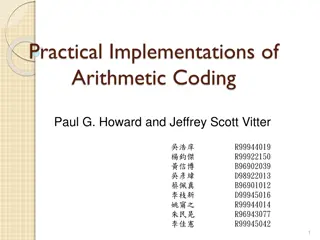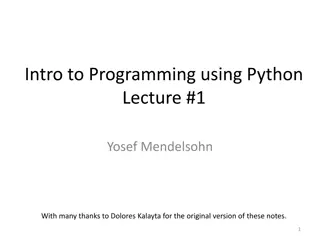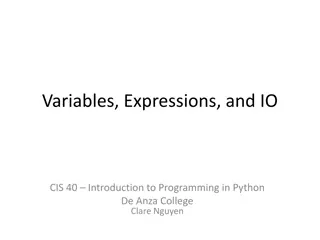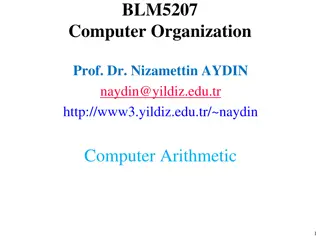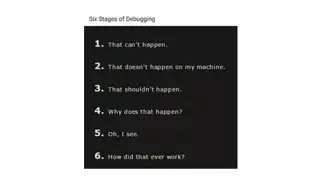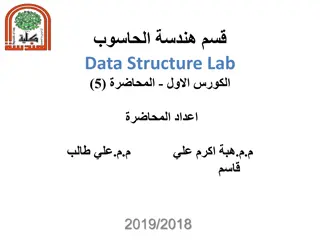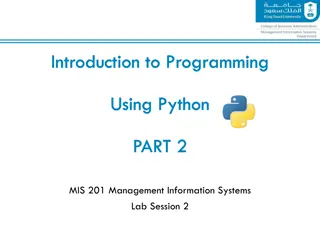Understanding Arithmetic Expressions and Constants in Programming
Learn about the importance of named constants and variables in arithmetic expressions, how to perform assignments with and without expressions, and the implications of working with integer and floating-point arithmetic in programming. Explore examples and exercises to enhance your programming skills.
Download Presentation

Please find below an Image/Link to download the presentation.
The content on the website is provided AS IS for your information and personal use only. It may not be sold, licensed, or shared on other websites without obtaining consent from the author. Download presentation by click this link. If you encounter any issues during the download, it is possible that the publisher has removed the file from their server.
E N D
Presentation Transcript
Arithmetic Expressions Lesson #2 Outline 1. Arithmetic Expressions Lesson #2 Outline 2. Named Constant & Variable Operands #1 3. Named Constant & Variable Operands #2 4. Named Constant & Variable Operands #3 5. Constant-Valued Expressions #1 6. Constant-Valued Expressions #2 7. Constant-Valued Expressions #3 8. Assignments W/O Expressions: Not Very Useful 9. Assignments with Expressions: Crucial 10. Meaning of Assignment w/Expression 11. Assignment w/Expression Example 12. Assignment w/Same Variable on Both Sides 13. Same Variable on Both Sides: Meaning 14. Same Variable on Both Sides: Example 15. 16. 17. 18. 19. 20. 21. 22. 23. 24. 25. 26. Single Mode Arithmetic int vs float Arithmetic int vs float Division int Division Truncates Division By Zero Division By Zero Example #1 Division By Zero Example #2 Floating Point Exception Mixed Mode Arithmetic #1 Mixed Mode Arithmetic #2 Promoting an int to a float Programming Exercise CS1313: Arithmetic Expressions Lesson #2 CS1313 Fall 2024 1
Named Constant & Variable Operands #1 So far, many of the examples of expressions that we ve looked at have used numeric literal constants as operands. But of course we already know that using numeric literal constants in the body of a program is BAD BAD BAD. So instead, we want to use named constants and variables as operands. CS1313: Arithmetic Expressions Lesson #2 CS1313 Fall 2024 2
Named Constant & Variable Operands #2 #include <stdio.h> int main () { /* main */ const int days_in_a_year = 365; const int hours_in_a_day = 24; const int minutes_in_an_hour = 60; const int seconds_in_a_minute = 60; const int program_success_code = 0; int year_of_birth, current_year, age_in_seconds; printf("Let me guess your age in seconds!\n"); printf("What year were you born?\n"); scanf("%d", &year_of_birth); printf("What year is this?\n"); scanf("%d", ¤t_year); age_in_seconds = (current_year - year_of_birth) * days_in_a_year * hours_in_a_day * minutes_in_an_hour * seconds_in_a_minute; printf("I'd guess that your age is about"); printf(" %d seconds.\n", age_in_seconds); return program_success_code; } /* main */ CS1313: Arithmetic Expressions Lesson #2 CS1313 Fall 2024 3
Named Constant & Variable Operands #3 % gcc -o age_in_seconds age_in_seconds.c % age_in_seconds Let me guess your age in seconds! What year were you born? 1985 What year is this? 2024 I'd guess that your age is about 1229904000 seconds. CS1313: Arithmetic Expressions Lesson #2 CS1313 Fall 2024 4
Constant-Valued Expressions #1 A constant-valued expression is an expression all of whose terms are constants (so its value, when evaluated, is also a constant). If we have an expression whose terms are all constants (either literal constants or named constants), then we can use that expression in the initialization of a named constant: const float C_to_F_factor = 9.0 / 5.0; const float C_to_F_increase = 32.0; const float C_water_boiling_temperature = 100.0; const float F_water_boiling_temperature = C_water_boiling_temperature * C_to_F_factor + C_to_F_increase; CS1313: Arithmetic Expressions Lesson #2 CS1313 Fall 2024 5
Constant-Valued Expressions #2 #include <stdio.h> int main () { /* main */ const float C_to_F_factor = 9.0 / 5.0; const float C_to_F_increase = 32.0; const float C_water_boiling_temperature = 100.0; const float F_water_boiling_temperature = C_water_boiling_temperature * C_to_F_factor + C_to_F_increase; printf("Water boils at %f degrees C,\n", C_water_boiling_temperature); printf(" which is %f degrees F.\n", F_water_boiling_temperature); } /* main */ NOTE: In the initialization of a named constant, we CANNOT have an expression whose value is NOT a constant. CS1313: Arithmetic Expressions Lesson #2 CS1313 Fall 2024 6
Constant-Valued Expressions #3 % gcc -o constant_expression constant_expression.c % constant_expression Water boils at 100.000000 degrees C, which is 212.000000 degrees F. NOTE: In the initialization of a named constant, we CANNOT have an expression whose value is NOT a constant. CS1313: Arithmetic Expressions Lesson #2 CS1313 Fall 2024 7
Assignments W/O Expressions: Not Very Useful So far, many of the assignment statements that we ve seen have simply assigned a literal value to a variable: % cat variable_assignment.c #include <stdio.h> int main () { /* main */ int x; x = 5; printf("x = %d\n", x); } /* main */ % gcc -o variable_assignment variable_assignment.c % variable_assignment x = 5 Unfortunately, this is not very interesting and won t accomplish much in an actual real life program. To make a program useful, most of the assignments have to have expressions on the right hand side. CS1313: Arithmetic Expressions Lesson #2 CS1313 Fall 2024 8
Assignments with Expressions: Crucial % cat triangle_area.c #include <stdio.h> int main () { /* main */ const float height_factor = 0.5; float base, height, area; printf("This program calculates the area of a\n"); printf(" triangle from its base and height.\n"); printf("What are the base and height?\n"); scanf("%f %f", &base, &height); area = height_factor * base * height; printf("The area of a triangle of base %f\n", base); printf(" and height %f is %f.\n", height, area); } /* main */ % gcc -o triangle_area triangle_area.c % triangle_area This program calculates the area of a triangle from its base and height. What are the base and height? 5 7 The area of a triangle of base 5.000000 and height 7.000000 is 17.500000. CS1313: Arithmetic Expressions Lesson #2 CS1313 Fall 2024 9
Meaning of Assignment w/Expression Suppose that we have an expression on the right hand side of an assignment: x = y + 1; Remember: An assignment statement is an ACTION, NOT an equation. This means: first, evaluate the expressionthat s on the right hand side of the assignment operator (single equals sign); then, put the resulting valueinto the variable that s on the left side of the assignment operator (single equals sign). In the example above, the assignment statement means: evaluate y + 1, then put the resulting value into x. CS1313: Arithmetic Expressions Lesson #2 CS1313 Fall 2024 10
Assignment w/Expression Example % cat x_gets_y_plus_1.c #include <stdio.h> int main () { /* main */ int x, y; y = 5; printf("y = %d\n", y); x = y + 1; printf("x = %d\n", x); } /* main */ % gcc -o x_gets_y_plus_1 x_gets_y_plus_1.c % x_gets_y_plus_1 y = 5 x = 6 CS1313: Arithmetic Expressions Lesson #2 CS1313 Fall 2024 11
Assignment w/Same Variable on Both Sides https://img-9gag-fun.9cache.com/photo/av59v7X_700bwp.jpg Here s another assignment: x = x + 1; The assignment statement above might be confusing, because it has the same variable, x, on both the left hand side and the right hand side of the single equals sign. IF THIS WERE AN EQUATION, IT D BE BAD. But it s NOTan equation, it s an ACTION. So the assignment above is GOOD. CS1313: Arithmetic Expressions Lesson #2 CS1313 Fall 2024 12
Same Variable on Both Sides: Meaning x = x + 1; This means: first, evaluate the expressionthat s on the right hand side of the assignment operator (equals sign); then, put the resulting valueinto the variable that s on the left hand side of the assignment operator (equals sign). So, the assignment statement above means: Get the current value of x, then add 1 to it, then put the new value back intox, replacing the previous value. CS1313: Arithmetic Expressions Lesson #2 CS1313 Fall 2024 13
Same Variable on Both Sides: Example % cat assign_self.c #include <stdio.h> int main () { /* main */ int x; x = 5; printf("After 1st assignment, x = %d\n", x); x = x + 1; printf("After 2nd assignment, x = %d\n", x); } /* main */ % gcc -o assign_self assign_self.c % assign_self After 1st assignment, x = 5 After 2nd assignment, x = 6 CS1313: Arithmetic Expressions Lesson #2 CS1313 Fall 2024 14
Single Mode Arithmetic In C, when we have an arithmetic expression whose terms all evaluate to a single data type (for example, all int-valued terms or all float-valued terms), we refer to this as single mode arithmetic. In C, single mode int arithmetic behaves like single mode float arithmetic most of the time. CS1313: Arithmetic Expressions Lesson #2 CS1313 Fall 2024 15
int vs float Arithmetic In C, single mode int arithmetic behaves like single mode float arithmetic most of the time. 5.0 + 7.0 5 + 7 5.0 - 7.0 5 - 7 5.0 * 7.0 5 * 7 12.0 and 12 -2.0 and -2 35.0 and 35 is is is is is is But, division is different for int versus float! CS1313: Arithmetic Expressions Lesson #2 CS1313 Fall 2024 16
int vs float Division Division is different for int versus float! 0.71... BUT 0 5.0 5 / / 7.0 7 is is We see that float division in C works the same way that division works in mathematics. But int division is a little bit strange. In int division, the result is truncatedto the nearest int whose absolute value is immediately less than or equal to the mathematical result. Truncate: to cut off (for example, to cut off the digits to the right of the decimal point) CS1313: Arithmetic Expressions Lesson #2 CS1313 Fall 2024 17
int Division Truncates 4.0 / 4.0 4 / 4 5.0 / 4.0 5 / 4 6.0 / 4.0 6 / 4 7.0 / 4.0 7 / 4 8.0 / 4.0 8 / 4 1.0 1 1.25 BUT 1 1.5 1 1.75 BUT 1 2.0 2 is is is is is is is is is is and BUT and CS1313: Arithmetic Expressions Lesson #2 CS1313 Fall 2024 18
Division By Zero Mathematically, division by zero gives an infinite result: c = for c 0 0 Or, more accurately, if you ve taken Calculus: The limit of c / x as xapproaches zero is arbitrarily large. Computationally, division by zero causes an error. CS1313: Arithmetic Expressions Lesson #2 CS1313 Fall 2024 19
Division By Zero Example #1 % cat divide_by_zero_constant.c #include <stdio.h> int main () { /* main */ printf("5 / 0 = %d\n", 5 / 0); } /* main */ % gcc -o divide_by_zero_constant divide_by_zero_constant.c divide_by_zero_constant.c: In function main : divide_by_zero_constant.c:4: warning: division by zero CS1313: Arithmetic Expressions Lesson #2 CS1313 Fall 2024 20
Division By Zero Example #2 % cat divide_by_zero.c #include <stdio.h> int main () { /* main */ int numerator, denominator, quotient; printf("What's the numerator?\n"); scanf("%d", &numerator); printf("What's the denominator?\n"); scanf("%d", &denominator); printf("numerator = %d\n", numerator); printf("denominator = %d\n", denominator); quotient = numerator / denominator; printf("numerator / denominator = %d\n", quotient); } /* main */ % gcc -o divide_by_zero divide_by_zero.c % divide_by_zero What's the numerator? 5 What's the denominator? 0 numerator = 5 denominator = 0 Floating exception CS1313: Arithmetic Expressions Lesson #2 CS1313 Fall 2024 21
Floating Point Exception % gcc -o divide_by_zero divide_by_zero.c % divide_by_zero What's the numerator? 5 What's the denominator? 0 numerator = 5 denominator = 0 Floating exception Note that, in the context of computing, the word exceptionmeans a very dumb thing to do. As in, I take exception to that. CS1313: Arithmetic Expressions Lesson #2 CS1313 Fall 2024 22
Mixed Mode Arithmetic #1 In principle, we might like our numeric expressions to have either all int-valued terms or all float-valued terms. In practice, we can, and often must, mix int-valued and float-valued terms literals, named constants, variables and subexpressions subject to the rule that an operation with operands of both data types has a float result. We call such expressions mixed modearithmetic. CS1313: Arithmetic Expressions Lesson #2 CS1313 Fall 2024 23
Mixed Mode Arithmetic #2 BUT and 1 1.0 1 1 1.0 1 1 1.0 1 1 1.0 1 + 2 + 2 + 2.0 - 2 - 2 - 2.0 * 2 * 2 * 2.0 / 2 / 2 / 2.0 3 3.0 3.0 -1 -1.0 -1.0 2 2.0 2.0 0 0.5 0.5 is is is is is is is is is is is is BUT and BUT and BUT and CS1313: Arithmetic Expressions Lesson #2 CS1313 Fall 2024 24
Promoting an int to a float For mixed mode arithmetic, we say that an int operand is promotedto float. BUT 1 / 2 is 0 1 1.0 / 2.0 4.0 / (3 / 2) / 2.0 is is 0.5 is 4.0 BUT 4.0 / (3.0 / 2) 4.0 / (3.0 / 2.0) is 2.666 is CS1313: Arithmetic Expressions Lesson #2 CS1313 Fall 2024 25
Programming Exercise Given a weight/mass in pounds, convert to weight/mass in metric tons. Specifically, draw a flowchart and then write a C program that: 1. greets the user; 2. prompts the user and then inputs an weight/mass in pounds; 3. calculates the weight/mass in metric tons; 4. outputs the weight/mass in both pounds and metric tons. The body of the program must not have any numeric literal constants; all constants must be declared using appropriate identifiers. Don t worry about comments. CS1313: Arithmetic Expressions Lesson #2 CS1313 Fall 2024 26



